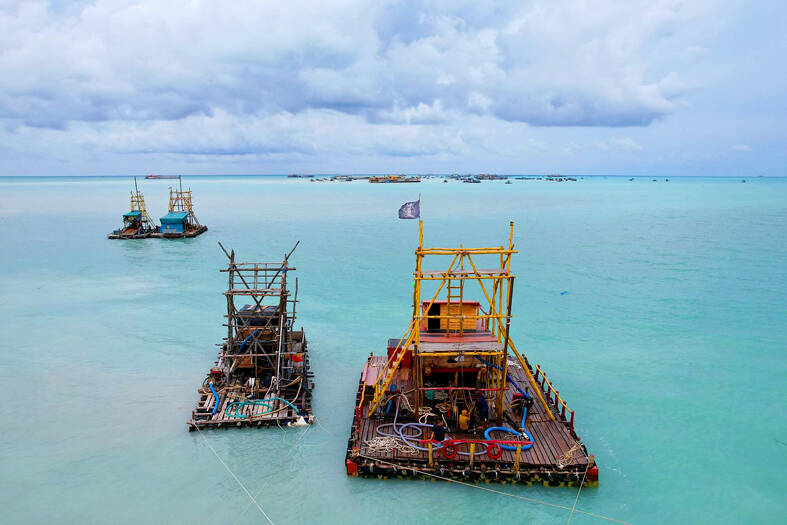Commodities from soybeans to precious metals jumped after China eased some COVID-19 restrictions, raising hopes of a demand recovery in the world’s second-biggest economy.
Almost all major commodities traded higher following China’s announcement.
Copper, precious metals and agricultural commodities from corn to wheat all climbed and as did shares of companies across the sector.

Photo: Bloomberg
China’s loosening of restrictions bolstered a rally that began on Wall Street, with risk assets rising after US inflation slowed.
Markets interpreted the data as a sign that the US Federal Reserve could slow down its aggressive interest rate hike plans.
A gauge of the US dollar has fallen sharply from its annual high, aiding commodities priced in the currency.
“Fundamentally the more China can restart its economy the greater the positive impact on global growth expectations,” Romco Group trading head Keith Wildie said. “China has historically been an exporter of deflationary pressures, and if we see that deflationary force back within the global economy then the positive impact on commodity prices and asset markets in general could be exceptionally significant in the near term.”
Base metals traded on the London Metal Exchange jumped, with zinc soaring as much as 6.4 percent and aluminum gaining 5.9 percent.
In the US, Chicago soybean futures had the biggest intraday increase in a month.
Shares of companies across the commodities industry surged.
Century Aluminum Co jumped 23 percent, the most in six years, while top US producer Alcoa Corp surged as much as 16 percent.
Offshore oil and gas driller Transocean Ltd added as much as 14 percent and oil refiner Phillips 66 climbed 5.6 percent to the highest since January 2020.

BIG BUCKS: Chairman Wei is expected to receive NT$34.12 million on a proposed NT$5 cash dividend plan, while the National Development Fund would get NT$8.27 billion Taiwan Semiconductor Manufacturing Co (TSMC, 台積電), the world’s largest contract chipmaker, yesterday announced that its board of directors approved US$15.25 billion in capital appropriations for long-term expansion to meet growing demand. The funds are to be used for installing advanced technology and packaging capacity, expanding mature and specialty technology, and constructing fabs with facility systems, TSMC said in a statement. The board also approved a proposal to distribute a NT$5 cash dividend per share, based on first-quarter earnings per share of NT$13.94, it said. That surpasses the NT$4.50 dividend for the fourth quarter of last year. TSMC has said that while it is eager

‘IMMENSE SWAY’: The top 50 companies, based on market cap, shape everything from technology to consumer trends, advisory firm Visual Capitalist said Taiwan Semiconductor Manufacturing Co (TSMC, 台積電) was ranked the 10th-most valuable company globally this year, market information advisory firm Visual Capitalist said. TSMC sat on a market cap of about US$915 billion as of Monday last week, making it the 10th-most valuable company in the world and No. 1 in Asia, the publisher said in its “50 Most Valuable Companies in the World” list. Visual Capitalist described TSMC as the world’s largest dedicated semiconductor foundry operator that rolls out chips for major tech names such as US consumer electronics brand Apple Inc, and artificial intelligence (AI) chip designers Nvidia Corp and Advanced

Saudi Arabian Oil Co (Aramco), the Saudi state-owned oil giant, yesterday posted first-quarter profits of US$26 billion, down 4.6 percent from the prior year as falling global oil prices undermine the kingdom’s multitrillion-dollar development plans. Aramco had revenues of US$108.1 billion over the quarter, the company reported in a filing on Riyadh’s Tadawul stock exchange. The company saw US$107.2 billion in revenues and profits of US$27.2 billion for the same period last year. Saudi Arabia has promised to invest US$600 billion in the US over the course of US President Donald Trump’s second term. Trump, who is set to touch

SKEPTICAL: An economist said it is possible US and Chinese officials would walk away from the meeting saying talks were productive, without reducing tariffs at all US President Donald Trump hailed a “total reset” in US-China trade relations, ahead of a second day of talks yesterday between top officials from Washington and Beijing aimed at de-escalating trade tensions sparked by his aggressive tariff rollout. In a Truth Social post early yesterday, Trump praised the “very good” discussions and deemed them “a total reset negotiated in a friendly, but constructive, manner.” The second day of closed-door meetings between US Secretary of the Treasury Scott Bessent, US Trade Representative Jamieson Greer and Chinese Vice Premier He Lifeng (何立峰) were due to restart yesterday morning, said a person familiar